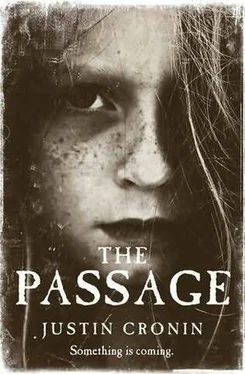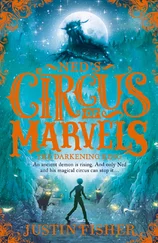They filled the bucket with wriggling fish; the abundance of the river seemed almost too much, like an overly extravagant present. The wide blue sky and the sun-dappled river and the forgotten countryside and the two of them together, in it: it all seemed, somehow, miraculous. Walking back to the house, Maus found her mind returning to the family in the pictures. The mother and the father and the two girls and the boy with his victorious, gap-toothed smile. They had lived here, died here. But most of all, she felt certain, they had lived.
They cleaned the fish and set the tender meat on racks in the smokehouse; tomorrow they would take them out to dry in the sun. One they saved for dinner, and cooked it in the pan with a bit of onion and one of the seedy potatoes.
As the sun was setting, Theo took up the shotgun from its place in the corner of the kitchen. Maus was putting the last of the dishes away in the cabinets. She turned to see him ejecting the shells, three of them, into his palm, blowing on each to clean the cap of dust, then sliding them back into the magazine. Next he removed his blade and cleaned this also, wiping it on his pants.
“Well.” He cleared his throat. “I guess it’s time.”
“No, Theo.”
She put down the plate she was holding and stepped toward him, taking the gun from his hands and placing it on the kitchen table.
“We’re safe here, I know it.” Even as she said the words, she felt their veracity. They were safe because she believed they were safe. “Don’t go.”
He shook his head. “I don’t think that’s such a good idea, Maus.”
She leaned her face into his and kissed him again, long and slow, so he would know this about her, about both of them. They were safe. Inside her, the baby had begun to hiccup.
“Come to bed, Theo,” said Mausami. “Please. I want you to come to bed with me, now.”
It was sleep he feared. He told her that night, as they lay curled together. He couldn’t not sleep; he knew that. Not sleeping was like not eating, he explained, or not breathing; it was like holding your breath in your chest as long as you could, until motes of light were dancing before your eyes and every part of you was saying one word: breathe . That’s what it had been like in the cell, for days and days and days.
And now: the dream was gone, but not the feeling of it. The fear that he would close his eyes and find himself in the dream again. Because, at the end, if not for the girl, he would have done it. She’d come into the dream and stayed his hand, but by then it was too late. He would have killed the woman, killed anyone. He would have done whatever they wanted. And once you knew that about yourself, he said, you could never unknow it. Whoever you thought you were, you were somebody else entirely.
She held him as he spoke, his voice drifting in the darkness, and then for a long time both of them were silent.
Maus? Are you awake?
I’m right here. Though this wasn’t so: she had, in fact, dozed off.
He shifted against her, pulling her arm over his chest like a blanket to keep him warm. Stay awake for me, he said. Can you do that? Until I’m asleep.
Yes, she said. Yes, I can do that.
He was quiet for a while. In the marginless space between their bodies, the baby flipped and kicked.
We’re safe here, Theo, she said. As long as we’re together, we’ll be safe.
I hope that’s true, he said.
I know it’s true, Mausami said. But even as she felt his breathing slow against her, sleep taking him at last, she kept her eyes open, staring into the dark. It’s true, she thought, because it has to be.
By the time they reached the garrison, it was midafternoon. Their packs had been returned but not their weapons; they were not prisoners, but neither were they free to go as they wished. The term the major had used was “under protection.” From the river they had marched straight north over the ridge. At the base of a second valley they’d come to a muddy trace, rutted with hoofprints and tire tracks. It was sheer chance that they had missed it on their own. Heavy clouds had moved in from the west; the air looked and felt like rain. As the first spits commenced to fall, Peter tasted woodsmoke in the wind.
Major Greer came up beside him. He was a tall, well-built man with a brow so furrowed it looked plowed. He might have been forty years old. He was dressed in loose-fitting camouflage spattered in a pattern of green and brown, drawn tight at the waist by a wide belt, pockets fat with gear. His head, covered by a woolen cap, was shaved clean. Like all his men, a squad of fifteen, he’d painted his face with streaks of mud and charcoal, giving the whites of his eyes a startling vividness. They looked like wolves, like creatures of the forest; they looked like the forest itself. A long-range patrol unit; they had been in the woods for weeks.
Greer paused on the path and shouldered his rifle. A black pistol was holstered at his waist. He took a long drink from his canteen and waved it toward the hillside. They were close now; Peter could feel it in the quickening step of Greer’s men. A hot meal, a cot to sleep on, a roof over their heads.
“Just over the next ridge,” Greer said.
In the intervening hours they had formed something that felt, to Peter, like the beginnings of a friendship. After the initial confusion of their capture, a situation compounded by the fact that neither group would agree to say who they were until the other blinked first, it was Michael who had broken the stalemate, lifting his vomit-smeared face from the dirt where the net had disgorged them to proclaim, “Oh, fuck. I surrender. We’re from California, all right? Somebody, please just shoot me so the ground will stop spinning.”
As Greer capped his canteen, Alicia caught up to them on the path. From the start she had been unusually silent. She’d voiced no objection to Greer’s order that they travel unarmed, a fact that now struck Peter as completely out of character. But probably she was just in shock, as they all were. For the duration of the march to camp she had kept protectively to Amy’s side. Perhaps, Peter thought, she was simply embarrassed that she’d led them straight into the soldiers’ trap. As for Amy, the girl seemed to have absorbed this new turn of events as she absorbed everything, with a neutral, watchful countenance.
“What’s it like?” he asked Greer.
The major shrugged. “Just like you’d think. It’s like a big latrine. It beats being out in the rain, though.”
As they crested the hill, nestled in a bowl-like valley below them, the garrison leapt into view: a cluster of canvas tents and vehicles ringed by a fence of timbers, fifteen meters tall at least and each honed at the top to a sharp point. Among the vehicles Peter saw at least half a dozen Humvees, two large tankers, and a number of smaller trucks, pickups and five-tons with heavy, mud-choked tires. At the perimeter, a dozen large floodlights stood on tall poles; at the far end of the compound horses were grazing in a paddock. More soldiers were moving among the buildings, and along a catwalk at the top of the wall. At the center of the compound, standing over all, a large flag flapped in the wind, blocks of red, white, and blue with a single white star. The whole thing couldn’t have been more than half a square kilometer, and yet, standing on the ridge, Peter felt as if he were gazing into an entire city, the heart of a world he’d always believed in but never actually imagined.
“They’ve got lights,” said Michael. More men from Greer’s unit moved past them, headed down the hill.
“Hell, son,” said the one named Muncey-a corporal, bald as the rest of them, with a wide, snaggle-toothed smile. Most of Greer’s men bore themselves with a soldierly silence, speaking only when spoken to, but not Muncey, who chattered like a bird. His job, fittingly, was to operate the radio, which he carried on his back, a mechanism with a generator run by a hand crank, which stuck from the bottom like a tail.
Читать дальше












